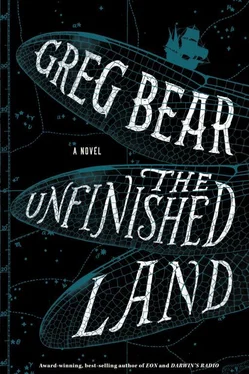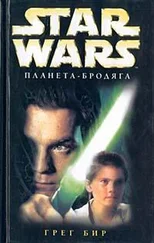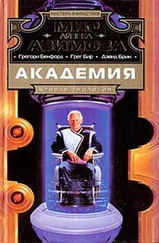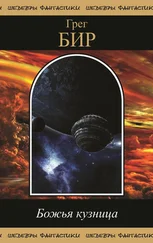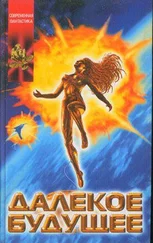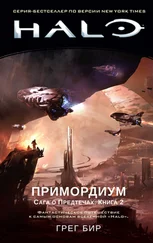“Thou must reach the island,” the dark visitor had told him. “Get thee swift to sea and find thy way to where the Crafters scrub and moil. That will be thy true beginning.”
“Who are you?” Reynard had asked in a trembling voice.
The dark man with purple eyes then faded, leaving Reynard on the road beside the hedgerow—alone and frightened. Later, the most memorable part of that odd vision had been that the man’s shadow was itself white. He had cast a white shadow.
The nearer Reynard had come to Southwold, the less he had felt comfortable with the dark man’s memory: dream or sorcery, trouble either way! And so he had tried to forget about him and told nobody, not even his mother, to whom he sometimes confided his dreams. He still had no explanation. But it was apparent he might not need to drink seawater to lose his mind.
Waves sloshed over his legs. Reynard stared at the worn fingers of his right hand, lifting them one after another, testing their flexibility. First he rearranged and retied the filthy, bloody tag of cloth on his little finger, serving as a bandage. The tag fell off and he saw that the old clot had closed over the exposed knuckle, making the bandage little more than a cushion. But he pushed it back over the wound and held his hand in closer, under his arm, moaning softly. After a time, he took out his hand and laid the fingers as straight as he could along his left arm and arranged, by folding and extending, a series of ogham symbols, engaging in rankalva —spelling out letter by letter old Irish words, as his grandmother had taught him, and as his mother had on occasion signed to him when she wanted chores done. “Do not show this to thine uncle,” his mother had advised. “He is unhappy with my side of the family. Oh, he is an honorable man, comes to that, but not ripe for such heresies…”
The letters and words, dancing from the fingers both injured and raw, brought him comfort. He could still shape the necessary letters, even though his hand throbbed. Somehow, that seemed important, though it was a skill he had never found useful after his grandmother’s death.
His uncle had been no-nonsense, straight as a staff and just as blunt in his opinions—unlike Reynard’s father, his brother, who married, gambled, drank, had a son, and then died, leaving the uncle to take up the family and feed and find work for Reynard, who had always borne a distinct resemblance, black hair and all, to his grandfather, also a tinker, ne’er-do-well, and gambler—so his uncle had claimed, with quiet dismay at how life plagued and challenged sensible men.
He closed his eyes briefly, then opened them and saw nothing changed. But his fingers had a life of their own.
Old Goidelic words now danced on them, spinning a silent tale of the Anakim, powerful giants who had once lived in the Holy Land, vexing Moses and Joshua, and upon being pushed out of those countries, had moved to Ireland and Scotland. There, many centuries before, they had married into the dark Picts and other tribes and had acted as scouts and beacons for the even darker Roma, their distant cousins—according to his grandmother. “Stone people, and big,” she had confided. “I met one once, long ago. Handsome and very large. Thought I to marry him, but mine own mither would hae none o’ it.”
Reynard had once asked the dotty old priest of Aldeburgh about the Anakim, and the priest had scoffed and suggested he read his Wycliffe. “Or seek’st thou a dark grammary, to learn magic? Thou hast that evil, Gypsy look, I wot.”
Neither his uncle nor his mother possessed so expensive and rare a thing as a family Bible. And besides, through lack of books, Reynard’s reading skills were haphazard, though he was swift enough with ogham and the finger-forms that spelled out words to those who wished to hide them.
Still, his grandmother’s secret signs had not satisfied. He had wished to read about and learn of all the places and histories and fables and other glorious things that book-words described. Four months back, one cloudy spring afternoon, he had used his one free day to venture out of the small fishing town and, unannounced, knock on the door of a man known to be a tutor in Aldeburgh. The external beams of the instructor’s two-story, half-timbered house were painted pink, and the door was set with purple stamped-glass windows in leaden frames. Reynard had knocked several times, at first light raps, then heavy bangs, on the thick oaken door, and asked the small stooped man who answered if he had books. Dubious, baldheaded, wearing a sagging, great-shouldered coat over a long gray gown, the instructor had looked him over briefly for weapons, then shrugged and led this strange boy inside. In a dark-shelved inner apartment, away from windows and sun, by the smoky light of a brass candle, Reynard had stared in green envy at the instructor’s shelves of vellum-bound books, dozens of them, spines pale gray or tan, with titles calligraphed on their spines in sepia or black ink. The instructor had held out a clutching hand, rubbed his fingers, and with sucked-in cheeks and pinched lips studied Reynard.
“How much money doth your family possess?” he had asked.
“I come from fisherfolk.”
“So… very little?” This made the man’s face turn red as a slice of beef. Unable to pay, Reynard had been shown the door, with a kick on his bum for farewell.
As he had made his return to Southwold through the gloaming, the same press gang, minus sad boys, almost caught him a second time, but he escaped through a half-overgrown wicker gate and fled through a copse alive with bird screeches. At least there had been no dark man with a white shadow.
With his fingers, he shaped more of his grandmother’s words, concluding stanzas to ancient songs he did not understand, filled with nonsense lists and riddles and begging equally nonsensical answers that nobody had ever explained—then sighed and folded both hands into fists. The bandage fell off again. This time, he did not replace it.
All of it was nonsense for a fisherboy, nonsense as useless as salt cod in a barrel. Would that the Anakim could rise again and vanquish England’s enemies! But they did not, and would not, ever. This was no longer such a world.
For months now, all England—and certainly the northeast coastal towns—had experienced a numbing terror inspired by actual threats, but promoted by the Queen’s own henchman: agents of Walsyngham and whoever could be encouraged or commanded to cry in the village squares or carry alarming handbills from town to town. Weeks before the battle, dire warnings had been posted at inns and around wells and on the docks. Each village was asked to help the effort against the Spanish by contributing ships and boats. Some villages demurred, made excuses; bet against the Queen, some said, a dangerous treason if the Spanish were defeated. Reynard read well enough to feel concern, but understood better the fear his uncle had expressed that not to give over the use of their hoy would bring down the Queen’s anger. Beloved as the Queen was by most not Catholic, no one wished her servant Walsyngham’s disapproval, and so Southwold had eventually compelled twelve boats, nine pinnaces and three hoys, to join the fleet.
Farmers as well were reluctant to donate crops and animals to supply the navy or the coastal defenses. Rarely traveling more than ten miles from their land, these yeomen and landowners had difficulty imagining, in their inland fastnesses, a broad, wet ocean. Such, his uncle said, was what it meant to be English these days—surrounded by devils, and the farmers and highborn on shore caught in tides of ignorance and stingy greed.
“For which God willing I’ll soon die,” Reynard murmured, then cringed as his lower lip split, and not for the first time.
Читать дальше
